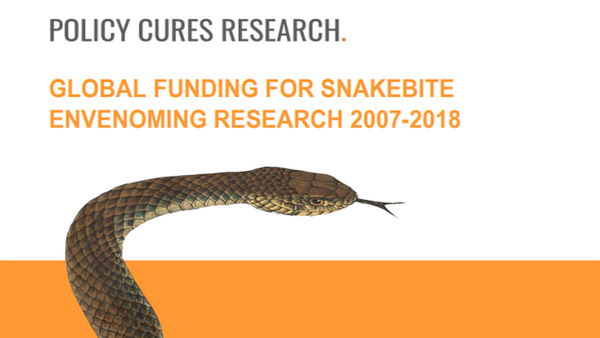
CSRI: Advocacy and Impact
The Centre for Snakebite Research and Intervention and its associated partners are involved within global policymaking and advocacy for snakebite.
To increase the awareness of snakebite the centre and its herpetarium are regularly used by various television networks with the UK and globally such as the BBC, BBC radio, ITV news, TedxTalks, and newspapers.
The research conducted within CSRI has been published extensively in the scientific literature.
Global Policy and Funding
Professor Robert Harrison and Professor David Lalloo, the director of LSTM, were key writers of the 2019 WHO strategy to reduce the death and disabilities caused by snakebites by 2030; the Snakebite Envenoming: A strategy for prevention and control. Similarly, Professors Lalloo, Harrison and Casewell were consulted by Wellcome trust on their 7 year, £80m strategy for Snakebite which was announced in May 2019.
The Wellcome Trust funded Policy Cures Research – Global Funding for SBE Research 2007-2018 identified the research at LSTM/CSRI as the most diverse and the funding received in 2018 by LSTM was only exceeded by funds received by industry
Research/Programme Impact
The NIHR Funded African Snakebite Research Group (ASRG) is a four year, £2.5 million, collaboration programme funded by the National Institute for Health Research under the first Global Health Research Programme call launched in 2016.
Launch of the DFID funded Scientific Research Partnership for Neglected Tropical Snakebite with the SRICs, IAVI and IISc to develop humanised monoclonal antibodies to treat systemic envenoming in Africa and India. The SRPNTS programme is the largest snakebite research consortium in the world with 96 researchers and has resulted in new research facilities, expertise and staff coming to SBE research.
The EchiTAb study, with funding from the Nigerian Government, was responsible for the development of the EchiTAb ASV, produced by MicroPharm as collaborative effort between LSTM and the University of Oxford. This ASV was the first to receive WHO’s ‘pre-qualiication’ approval. EchiTAb is a safe and effective ASV found to reduced fatalities to 1.5% from 35-45% with most patients requiring only a single vial compared to 6 of other ASV (Ademola-Majekodumni et al, Bull Soc Path Exot, 2012). Ongoing to expand the ASV to cover SBE from neurotoxic snakes specoes such as Naja mossambica, Naja annulifera, Dendroaspis polylepis and Hemachatus haemachatus. The Study group is recognized as a South-South/North-South model intervention for SBE.
NIHR-Funded Financial Assurance Fund (FAF), through the ASRG, was used to strengthen the grant management systems at IPR and the BUK. This allowed both IPR and BUK to obtain their bronze accreditation for Good Financial Grant Practices (GFGP); the second and third institutes globally and first and second in Africa to receive this.
The research conducted within CSRI has been published extensively in the scientific literature.
Government Advocacy
Furthermore, the group is involved with the All-Party Parliamentary Group (APPG) on Malaria and Neglected Tropical Diseases (NTDs) in which the issues of tropical snakebite and the global burden were presented to both MPs and members of the House of Lords.
Through the ASRG and SRPNTS programmes multiple symposiums to promote snakebite awareness and research have been held with government officials, health works, teachers, community care works and NGOs in India and Kenya.

